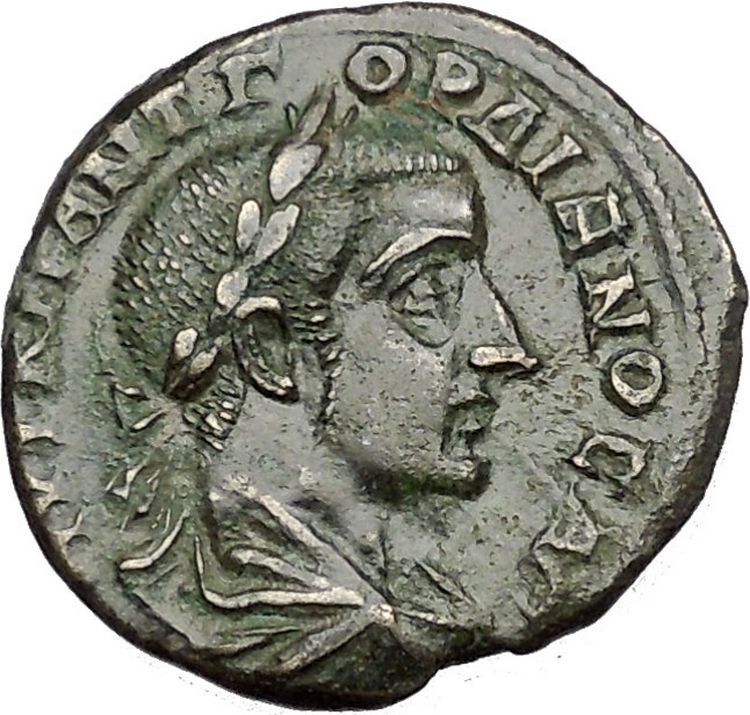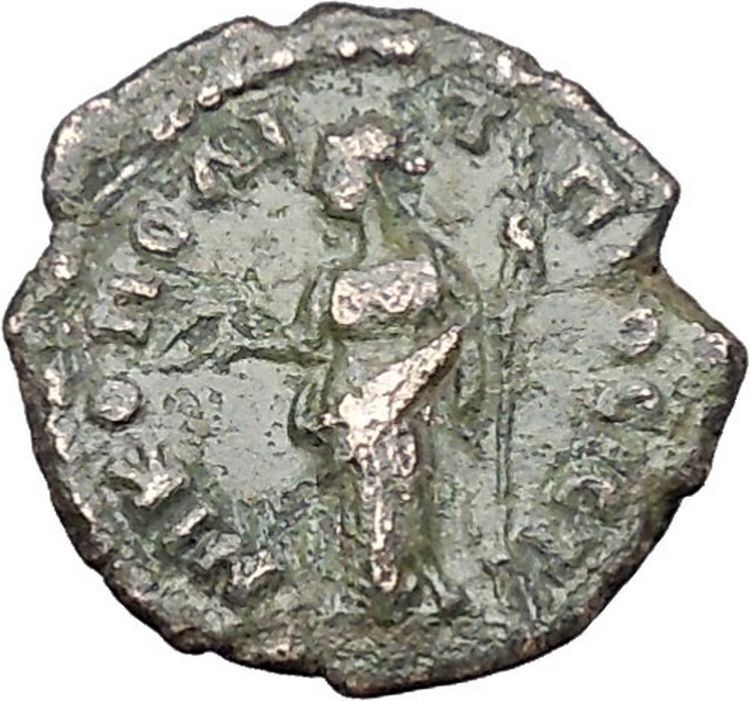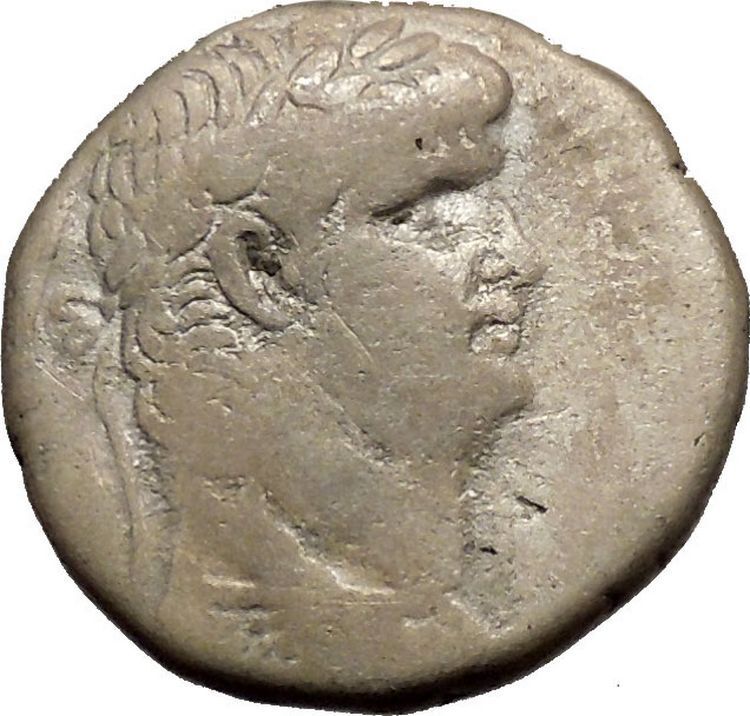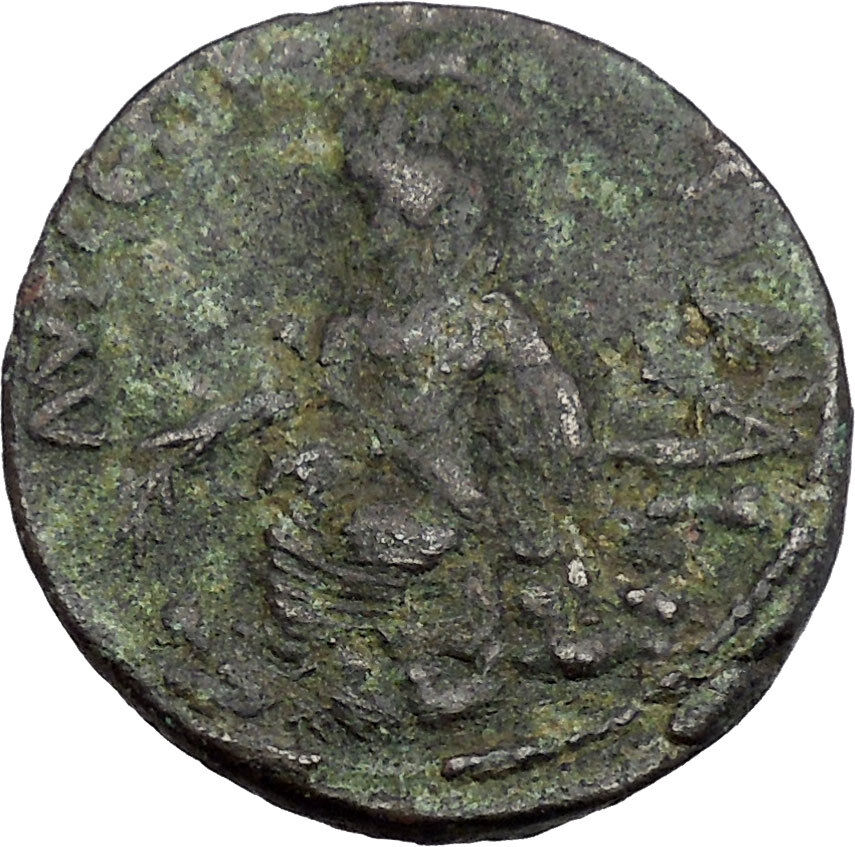|
Commodus
–
Roman Emperor
: 177-192 A.D.
Bonze 24mm (13.61 grams) of
<=”” font=”” color=”#000000″ face=”Times New Roman”>
Thessalonica
in
Macedonia
circa 166-177 A.D.
Reference: Touroratsoglou 1-23; Varbanov 4323
Bare-headed, draped bust right.
ΘЄCCAΛONIKЄΩN, <=”” font=”” color=”#000000″>
Nike
advancing right holding wreath and palm.
You are bidding on the exact
item pictured, provided with a Certificate of Authenticity and Lifetime
Guarantee of Authenticity.
In
Greek mythology
,
Nike
was a goddess
who personified
victory
, also known as the Winged Goddess of
Victory. The Roman equivalent was
Victoria
. Depending upon the time of various
myths, she was described as the daughter of
Pallas
(Titan) and
Styx (Water) and the sister of
Kratos
(Strength),
Bia
(Force), and
Zelus
(Zeal). Nike and her siblings were close
companions of Zeus
, the dominant deity of the
Greek pantheon
. According to classical (later)
myth, Styx brought them to Zeus when

the
god was assembling allies for the
Titan War
against the older deities. Nike
assumed the role of the divine
charioteer
, a role in which she often is
portrayed in Classical Greek art. Nike flew around battlefields rewarding the
victors with glory and fame.
Nike is seen with wings in most statues and paintings. Most other winged
deities in the Greek pantheon had shed their wings by Classical times. Nike is
the goddess of strength, speed, and victory. Nike was a very close acquaintance
of Athena
, and is thought to have stood in
Athena’s outstretched hand in the statue of Athena located in the Parthenon.
Nike is one of the most commonly portrayed figures on Greek coins.
Names stemming from Nike include amongst others:
Nicholas
, Nicola, Nick, Nikolai, Nils, Klaas,
Nicole, Ike, Niki, Nikita, Nika, Niketas, and Nico.
<=”” span=””>
The city Thessalonica in Macedonia was founded around
315 BC
by the
King Cassander of Macedon
, on or near the site
of the ancient town of
Therma
and twenty-six other local villages. He
named it after his wife
Thessalonike
, a half-sister of
Alexander the Great
. She gained her name
(“victory of Thessalians”: Gk
nikē
“victory”) from her father,
Philip II
, to commemorate her birth on the day
of his gaining a victory over the
Phocians
, who were defeated with the help of
Thessalian
horsemen, the best in Greece at that
time. Thessaloniki developed rapidly and as early as the
2nd century BC
the first walls were built,
forming a large square. It was an autonomous part of the Kingdom of
Macedon
, with its own parliament where the King
was represented and could interfere in the city’s domestic affairs.
Roman
era
After the fall of the kingdom of Macedon in
168 BC
, Thessalonica became a city of the
Roman Republic
. It grew to be an important
trade-hub located on the
Via Egnatia
, the
Roman road
connecting
Byzantium
(later
Constantinople
), with
Dyrrhachium
(now
Durrës
in
Albania
), and facilitating trade between Europe
and Asia. The city became the capital of one of the four Roman districts of
Macedonia; it kept its privileges but was ruled by a
praetor
and had a Roman garrison, while for a
short time in the
1st century BC
, all the Greek provinces came
under Thessalonica (the Latin form of the name). Due to the city’s key
commercial importance, a spacious harbour was built by the Romans, the famous
Burrowed Harbour (Σκαπτός Λιμήν) that accommodated the town’s trade up to
the eighteenth century; later, with the help of silt deposits from the river
Axios
, it was reclaimed as land and the port
built beyond it. Remnants of the old harbour’s docks can be found in the present
day under Odos Frangon Street, near the Catholic Church.
Thessaloniki’s
acropolis
, located in the northern hills, was
built in 55 BC
after
Thracian
raids in the city’s outskirts, for
security reasons.
The city had a
Jewish
colony, established during the
first century
, and was to be an early centre of
Christianity
. On his second missionary journey,
Paul
of Tarsus
, born a Hellenized Israelite,
preached in the city’s synagogue, the chief synagogue of the Jews in that part
of Thessaloniki, and laid the foundations of a church. Other Jews opposed to
Paul drove him from the city, and he fled to
Veroia
. Paul wrote two of his
epistles
to the Christian community at
Thessalonica, the
First Epistle to the Thessalonians
and the
Second Epistle to the Thessalonians
.
Thessaloníki acquired a patron saint,
St. Demetrius
, in 306. He is credited with a
number of miracles that saved the city, and was the Roman
Proconsul
of Greece under the anti-Christian
emperor Maximian
, later martyred at a Roman prison
where today lies the
Church of St. Demetrius
, first built by the
Roman sub-prefect of
Illyricum
Leontios in 463. Other important
remains from this period include the
Arch and Tomb of Galerius
, located near the
centre of the modern city.
<=”” font=”” color=”#000000″>
Commodus (Latin:
Marcus Aurelius Commodus Antoninus Augustus;
31 August, 161 AD – 31 December, 192 AD), was
Roman Emperor
from 180 to 192. He also ruled as
co-emperor with his father
Marcus Aurelius
from 177 until his father’s
death in 180.
His accession as emperor was the first time a son had succeeded his father
since Titus
succeeded
Vespasian
in 79. He was also the first Emperor
to have both a father and grandfather as the two preceding Emperors. Commodus
was the first (and until 337 the only) emperor “born
in the purple“; i.e. during his father’s reign.
Commodus was assassinated in 192.
Early life and rise to power (161–180)
Early life
Commodus was born on 31 August 161, as Commodus, in
Lanuvium
, near
Rome
. He was the son of the reigning emperor,
Marcus Aurelius, and Aurelius’s first cousin, Faustina the Younger; the youngest
daughter of
Roman Emperor
Antonius Pius
. Commodus had an elder twin
brother, Titus Aurelius Fulvus Antoninus, who died in 165. On 12 October 166,
Commodus was made
Caesar
together with his younger brother,
Marcus Annius Verus
. The latter died in 169
having failed to recover from an operation, which left Commodus as Marcus
Aurelius’ sole surviving son.
He was looked after by his father’s physician,
Galen
, in order to keep Commodus healthy and
alive. Galen treated many of Commodus’ common illnesses. Commodus received
extensive tuition at the hands of what Marcus Aurelius called “an abundance of
good masters.” The focus of Commodus’ education appears to have been
intellectual, possibly at the expense of military training.
Commodus is known to have been at
Carnuntum
, the headquarters of Marcus Aurelius
during the
Marcomannic Wars
, in 172. It was presumably
there that, on 15 October 172, he was given the victory title Germanicus,
in the presence of the
army
. The title suggests that Commodus was
present at his father’s victory over the
Marcomanni
. On 20 January 175, Commodus entered
the
College of Pontiffs
, the starting point of a
career in public life.
In April 175,
Avidius Cassius
, Governor of
Syria
, declared himself Emperor following
rumors that Marcus Aurelius had died. Having been accepted as Emperor by Syria,
Palestine
and
Egypt
, Cassius carried on his rebellion even
after it had become obvious that Marcus was still alive. During the preparations
for the campaign against Cassius, the Prince assumed his
toga virilis
on the
Danubian
front on 7 July 175, thus formally
entering
adulthood
. Cassius, however, was killed by one
of his centurions
before the campaign against him
could begin.
Commodus subsequently accompanied his father on a lengthy trip to the Eastern
provinces, during which he visited
Antioch
. The Emperor and his son then traveled
to Athens
, where they were initiated into the
Eleusinian mysteries
. They then returned to
Rome in the Autumn
of 176.
Joint rule
with father (177)
Marcus Aurelius was the first emperor since
Vespasian
to have a biological son of his own
and, though he himself was the fifth in the line of the so-called
Five Good Emperors
, each of whom had adopted
his successor, it seems to have been his firm intention that Commodus should be
his heir. On 27 November 176, Marcus Aurelius granted Commodus the rank of
Imperator
and, in the middle of 177, the
title
Augustus
, giving his son the same status as
his own and formally sharing power.
On 23 December of the same year, the two Augusti celebrated a joint
triumph
, and Commodus was given
tribunician
power. On 1 January 177, Commodus
became consul
for the first time, which made him, aged
15, the youngest consul in Roman history up to that time. He subsequently
married
Bruttia Crispina
before accompanying his father
to the Danubian front once more in 178, where Marcus Aurelius died on 17 March
180, leaving the 18-year-old Commodus sole emperor.
Sole reign
(180–192)
Upon his accession Commodus devalued the
Roman currency
. He reduced the weight of the
denarius
from 96 per
Roman pound
to 105 (3.85 grams to 3.35 grams).
He also reduced the silver purity from 79 percent to 76 percent – the silver
weight dropping from 2.57 grams to 2.34 grams. In 186 he further reduced the
purity and silver weight to 74 percent and 2.22 grams respectively, being 108 to
the Roman pound. His reduction of the denarius during his rule was the largest
since the empire’s first devaluation during
Nero‘s reign.
Whereas the reign of
Marcus Aurelius
had been marked by almost
continuous warfare, that of Commodus was comparatively peaceful in the military
sense but was marked by political strife and the increasingly arbitrary and
capricious behaviour of the emperor himself. In the view of
Dio Cassius
, a contemporary observer, his
accession marked the descent “from a kingdom of gold to one of rust and iron” –
a famous comment which has led some historians, notably
Edward Gibbon
, to take Commodus’s reign as the
beginning of the
decline of the Roman Empire
.
Despite his notoriety, and considering the importance of his reign,
Commodus’s years in power are not well chronicled. The principal surviving
literary sources are Dio Cassius (a contemporary and sometimes first-hand
observer, but for this reign, only transmitted in fragments and abbreviations),
Herodian
and the
Historia Augusta
(untrustworthy for its
character as a work of literature rather than history, with elements of fiction
embedded within its biographies; in the case of Commodus, it may well be
embroidering upon what the author found in reasonably good contemporary
sources).
Commodus remained with the Danube armies for only a short time before
negotiating a peace treaty with the Danubian tribes. He then returned to Rome
and celebrated a triumph for the conclusion of the wars on 22 October 180.
Unlike the preceding Emperors
Trajan
,
Hadrian
,
Antoninus Pius
and Marcus Aurelius, he seems to
have had little interest in the business of administration and tended throughout
his reign to leave the practical running of the state to a succession of
favourites, beginning with
Saoterus
, a freedman from
Nicomedia
who had become his
chamberlain
.
Dissatisfaction with this state of affairs would lead to a series of
conspiracies and attempted coups, which in turn eventually provoked Commodus to
take charge of affairs, which he did in an increasingly dictatorial manner.
Nevertheless, though the
senatorial order
came to hate and fear him, the
evidence suggests that he remained popular with the army and the common people
for much of his reign, not least because of his lavish shows of largesse
(recorded on his coinage) and because he staged and took part in spectacular
gladiatorial
combats.
One of the ways he paid for his donatives and mass entertainments was to tax
the senatorial order, and on many inscriptions, the traditional order of the two
nominal powers of the state, the Senate and People (Senatus Populusque
Romanus) is provocatively reversed (Populus Senatusque…).
The conspiracies of
182
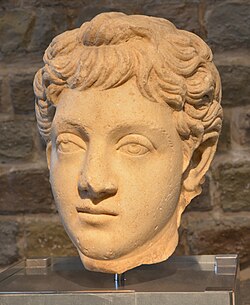
A bust of Commodus as a youth (Roman-Germanic
Museum, Cologne).
At the outset of his reign, Commodus, age 18, inherited many of his father’s
senior advisers, notably
Tiberius Claudius Pompeianus
(the second
husband of Commodus’s sister
Lucilla
), his father-in-law
Gaius Bruttius Praesens
, Titus Fundanius
Vitrasius Pollio, and
Aufidius Victorinus
, who was
Prefect of the City of Rome
. He also had five
surviving sisters, all of them with husbands who were potential rivals. Four of
his sisters were considerably older than he; the eldest, Lucilla, held the rank
of
Augusta
as the widow of her first husband,
Lucius Verus
.
The first crisis of the reign came in 182, when Lucilla engineered a
conspiracy against her brother. Her motive is alleged to have been envy of the
Empress
Crispina. Her husband, Pompeianus, was
not involved, but two men alleged to have been her lovers,
Marcus Ummidius Quadratus Annianus
(the consul
of 167, who was also her first cousin) and
Appius Claudius Quintianus
, attempted to murder
Commodus as he entered the theatre. They bungled the job and were seized by the
emperor’s bodyguard.
Quadratus and Quintianus were executed. Lucilla was exiled to
Capri
and later killed. Pompeianus retired from
public life. One of the two
praetorian prefects
,
Tarrutenius Paternus
, had actually been
involved in the conspiracy but was not detected at this time, and in the
aftermath, he and his colleague
Sextus Tigidius Perennis
were able to arrange
for the murder of Saoterus, the hated chamberlain.
Commodus took the loss of Saoterus badly, and Perennis now seized the chance
to advance himself by implicating Paternus in a second conspiracy, one
apparently led by
Publius Salvius Julianus
, who was the son of
the jurist
Salvius Julianus
and was betrothed to
Paternus’s daughter. Salvius and Paternus were executed along with a number of
other prominent consulars and senators.
Didius Julianus
, the future emperor, a relative
of Salvius Julianus, was dismissed from the governorship of
Germania Inferior
.
Cleander
Perennis took over the reins of government and Commodus found a new
chamberlain and favourite in
Cleander
, a
Phrygian
freedman
who had married one of the emperor’s
mistresses, Demostratia. Cleander was in fact the person who had murdered
Saoterus. After those attempts on his life, Commodus spent much of his time
outside Rome, mostly on the family estates at Lanuvium. Being physically strong,
his chief interest was in sport: taking part in
horse racing
,
chariot racing
, and combats with beasts and
men, mostly in private but also on occasion in public.
Dacia and Britain

A bust of Commodus (Kunsthistorisches
Museum, Vienna). According to
Herodian
he was well proportioned
and attractive, with naturally blonde and curly hair.
Commodus was inaugurated in 183 as consul with Aufidius Victorinus for a
colleague and assumed the title
Pius. War broke out in
Dacia
: few details are available, but it
appears two future contenders for the throne,
Clodius Albinus
and
Pescennius Niger
, both distinguished themselves
in the campaign. Also, in
Britain
in 184, the governor
Ulpius Marcellus
re-advanced the Roman frontier
northward to the
Antonine Wall
, but the
legionaries
revolted against his harsh
discipline and acclaimed another legate, Priscus, as emperor.
Priscus refused to accept their acclamations, but Perennis had all the
legionary legates
in Britain
cashiered
. On 15 October 184 at the
Capitoline Games
, a
Cynic
philosopher publicly denounced Perennis
before Commodus, who was watching, but was immediately put to death. According
to Dio Cassius, Perennis, though ruthless and ambitious, was not personally
corrupt and generally administered the state well.
However, the following year, a detachment of soldiers from Britain (they had
been drafted to
Italy
to suppress brigands) also denounced
Perennis to the emperor as plotting to make his own son emperor (they had been
enabled to do so by Cleander, who was seeking to dispose of his rival), and
Commodus gave them permission to execute him as well as his wife and sons. The
fall of Perennis brought a new spate of executions: Aufidius Victorinus
committed suicide. Ulpius Marcellus was replaced as
governor of Britain
by
Pertinax
; brought to Rome and tried for
treason, Marcellus narrowly escaped death.
Cleander’s zenith and fall (185–190)
Cleander proceeded to concentrate power in his own hands and to enrich
himself by becoming responsible for all public offices: he sold and bestowed
entry to the Senate, army commands,
governorships
and, increasingly, even the
suffect consulships
to the highest bidder.
Unrest around the empire increased, with large numbers of army deserters causing
trouble in Gaul
and
Germany
. Pescennius Niger mopped up the
deserters in Gaul in a military campaign, and a revolt in
Brittany
was put down by two
legions
brought over from Britain.
In 187, one of the leaders of the deserters, Maternus, came from Gaul
intending to assassinate Commodus at the Festival of the Great Goddess in March,
but he was betrayed and executed. In the same year,
Pertinax
unmasked a conspiracy by two enemies
of Cleander – Antistius Burrus (one of Commodus’s brothers-in-law) and Arrius
Antoninus. As a result, Commodus appeared even more rarely in public, preferring
to live on his estates.
Early in 188, Cleander disposed of the current praetorian prefect,
Atilius Aebutianus
, and himself took over
supreme command of the Praetorians at the new rank of a pugione
(“dagger-bearer”) with two praetorian prefects subordinate to him. Now at the
zenith of his power, Cleander continued to sell public offices as his private
business. The climax came in the year 190, which had 25 suffect consuls – a
record in the 1000-year history of the Roman consulship—all appointed by
Cleander (they included the future Emperor
Septimius Severus
).
In the spring of 190, Rome was afflicted by a food shortage, for which the
praefectus annonae
Papirius Dionysius
, the official actually in
charge of the
grain supply
, contrived to lay the blame on
Cleander. At the end of June, a mob demonstrated against Cleander during a horse
race in the
Circus Maximus
: he sent the praetorian guard to
put down the disturbances, but Pertinax, who was now City Prefect of Rome,
dispatched the
Vigiles Urbani
to oppose them. Cleander
fled to Commodus, who was at
Laurentum
in the house of the
Quinctilii
, for protection, but the mob
followed him calling for his head.
At the urging of his mistress
Marcia
, Commodus had Cleander beheaded and his
son killed. Other victims at this time were the praetorian prefect Julius
Julianus, Commodus’s cousin
Annia Fundania Faustina
, and his brother-in-law
Mamertinus. Papirius Dionysius was executed too.
The emperor now changed his name to Lucius Aelius Aurelius Commodus. At 29,
he took over more of the reins of power, though he continued to rule through a
cabal consisting of Marcia, his new chamberlain Eclectus, and the new praetorian
prefect
Quintus Aemilius Laetus
, who about this time
also had many Christians freed from working in the mines in
Sardinia
. Marcia, the widow of Quadratus, who
had been executed in 182, is alleged to have been a Christian.
Megalomania
(190–192)
In opposition to the Senate, in his pronouncements and
iconography
, Commodus had always laid stress on
his unique status as a source of god-like power, liberality and physical
prowess. Innumerable statues around the empire were set up portraying him in the
guise of Hercules
, reinforcing the image of him as a
demigod, a physical giant, a protector and a battler against beasts and men (see
“Commodus and Hercules” and “Commodus the Gladiator” below). Moreover, as
Hercules, he could claim to be the son of
Jupiter
, the representative of the supreme god
of the Roman
pantheon
. These tendencies now increased to
megalomaniac
proportions. Far from celebrating
his descent from Marcus Aurelius, the actual source of his power, he stressed
his own personal uniqueness as the bringer of a new order, seeking to re-cast
the empire in his own image.
During 191, the city of Rome was extensively damaged by a fire that raged for
several days, during which many public buildings including the
Temple of Pax
, the
Temple of Vesta
and parts of the imperial
palace were destroyed.
Perhaps seeing this as an opportunity, early in 192 Commodus, declaring
himself the new
Romulus
, ritually re-founded Rome, renaming the
city Colonia Lucia Annia Commodiana. All the months of the year were
renamed to correspond exactly with his (now twelve) names: Lucius,
Aelius, Aurelius, Commodus, Augustus, Herculeus,
Romanus, Exsuperatorius, Amazonius, Invictus,
Felix, Pius. The legions were renamed Commodianae, the fleet
which imported grain from
Africa
was termed Alexandria Commodiana
Togata, the Senate was entitled the Commodian Fortunate Senate, his palace
and the Roman people themselves were all given the name Commodianus, and
the day on which these reforms were decreed was to be called Dies Commodianus.
Thus he presented himself as the fountainhead of the Empire and Roman life
and religion. He also had the head of the
Colossus of Nero
adjacent to the
Colosseum
replaced with his own portrait, gave
it a club and placed a
bronze
lion at its feet to make it look like Hercules, and added an
inscription boasting of being “the only left-handed fighter to conquer twelve
times one thousand men”.
Character and
physical prowess
Character and
motivations
Dio Cassius, a first-hand witness, describes him as “not naturally wicked
but, on the contrary, as guileless as any man that ever lived. His great
simplicity, however, together with his cowardice, made him the slave of his
companions, and it was through them that he at first, out of ignorance, missed
the better life and then was led on into lustful and cruel habits, which soon
became second nature.”[8]
His recorded actions do tend to show a rejection of his father’s policies,
his father’s advisers, and especially his father’s austere lifestyle, and an
alienation from the surviving members of his family. It seems likely that he was
brought up in an atmosphere of
Stoic
asceticism
, which he rejected entirely upon his
accession to sole rule. After repeated attempts on Commodus’ life,
Roman citizens
were often killed for raising
his ire. One such notable event was the attempted extermination of the house of
the Quinctilii. Condianus and Maximus were executed on the pretext that, while
they were not implicated in any plots, their wealth and talent would make them
unhappy with the current state of affairs.
Changes of name
On his accession as sole ruler, Commodus added the name Antoninus to his
official nomenclature. In October 180 he changed his
praenomen
from Lucius to Marcus, presumably
in honour of his father. He later took the title of Felix in 185. In 191
he restored his praenomen to Lucius and added the family name Aelius,
apparently linking himself to Hadrian and Hadrian’s adopted son
Lucius Aelius Caesar
, whose original name was
also Commodus.
Later that year he dropped Antoninus and adopted as his full style Lucius
Aelius Aurelius Commodus Augustus Herculeus Romanus Exsuperatorius Amazonius
Invictus Felix Pius (the order of some of these titles varies in the sources).
“Exsuperatorius” (the supreme) was a title given to Jupiter, and “Amazonius”
identified him again with Hercules.
An inscribed altar from
Dura-Europos
on the Euphrates shows that
Commodus’s titles and the renaming of the months were disseminated to the
furthest reaches of the Empire; moreover, that even auxiliary military units
received the title Commodiana, and that Commodus claimed two additional titles:
Pacator Orbis (pacifier of the world) and Dominus Noster (Our
Lord). The latter eventually would be used as a conventional title by Roman
emperors, starting about a century later, but Commodus seems to have been the
first to assume it.
Commodus and Hercules
Disdaining the more philosophic inclinations of his father, Commodus was
extremely proud of his physical prowess. He was generally acknowledged to be
extremely handsome. As mentioned above, he ordered many statues to be made
showing him dressed as Hercules with a lion’s hide and a club. He thought of
himself as the reincarnation of Hercules, frequently emulating the legendary
hero’s feats by appearing in the arena to fight a variety of wild animals. He
was left-handed, and very proud of the fact. Cassius Dio and the writers of the
Augustan History
say that Commodus was a
skilled archer, who could shoot the heads off
ostriches
in full gallop, and kill a
panther
as it attacked a victim in the arena.
Commodus the gladiator
Commodus also had a passion for gladiatorial combat, which he took so far as
to take to the arena
himself, dressed as a gladiator. The
Romans found Commodus’s naked gladiatorial combats to be scandalous and
disgraceful. It was rumoured that he was actually the son, not of Marcus
Aurelius, but of a gladiator whom his mother Faustina had taken as a lover at
the coastal resort of
Caieta
.
In the arena, Commodus always won since his opponents always submitted to the
emperor. Thus, these public fights would not end in death. Privately, it was his
custom to slay his practice opponents. For each appearance in the arena, he
charged the city of Rome a million
sesterces
, straining the Roman economy.
Commodus raised the ire of many military officials in Rome for his Hercules
persona in the arena. Often, wounded soldiers and amputees would be placed in
the arena for Commodus to slay with a sword. Commodus’s eccentric behaviour
would not stop there. Citizens of Rome missing their feet through accident or
illness were taken to the arena, where they were tethered together for Commodus
to club to death while pretending they were giants. These acts may have
contributed to his assassination.
Commodus was also known for fighting exotic animals in the arena, often to
the horror of the Roman people. According to Gibbon, Commodus once killed 100
lions in a single day. Later, he decapitated a running ostrich with a specially
designed dart and afterwards carried the bleeding head of the dead bird and his
sword over to the section where the Senators sat and gesticulated as though they
were next. On another occasion, Commodus killed three
elephants
on the floor of the arena by himself.
Finally, Commodus killed a
giraffe
, which was considered to be a strange
and helpless beast.
Assassination (192)
In November 192 Commodus held Plebian Games, in which he shot hundreds of
animals with arrows and javelins every morning, and fought as a gladiator every
afternoon, winning all the bouts. In December he announced his intention to
inaugurate the year 193 as both consul and gladiator on 1 January.
At this point, the prefect Laetus formed a conspiracy with Eclectus to
supplant Commodus with Pertinax, taking Marcia into their confidence. On 31
December Marcia poisoned his food but he vomited up the poison; so the
conspirators sent his wrestling partner
Narcissus
to strangle him in his bath. Upon his
death, the Senate declared him a public enemy (a de facto
damnatio memoriae
) and restored the
original name to the city of Rome and its institutions. Commodus’s statues were
thrown down. His body was buried in the
Mausoleum of Hadrian
. In 195 the emperor
Septimius Severus
, trying to gain favour with
the family of Marcus Aurelius, rehabilitated Commodus’s memory and had the
Senate deify him.
Commodus was succeeded by
Pertinax
, whose reign was short lived, being
the first to fall victim to the
Year of the Five Emperors
. Commodus’s death
marked the end of the
Nervan-Antonian dynasty
.
|








